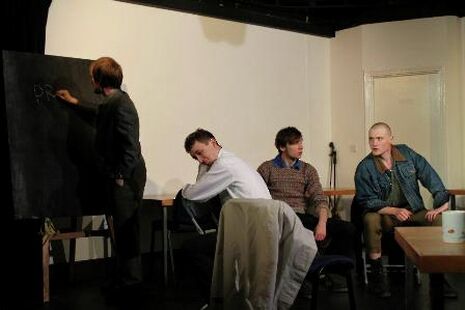Theatre: Comedians
Salome Wagaine on a compelling production with a central, transfixing performance
Comedians, set in 1970s Manchester, is very much a play of its time in terms of the kind of comedy and attitudes it depicts and condemns. However, Harry Michell’s choice to direct a show about aspiring funny men (other than his being Footlights President) brought with it a certain relevancy almost immediately owing to the fact the set was deeply reminiscent of that of the History Boys.
And, indeed, the show can be seen as a cross between Bennett’s and Patrick Marber’s Dealer’s Choice: inspirational teacher Eddie Waters (played wonderfully by Max Upton) in conflict with Bert Challenor, the much more pragmatic talent scout (Stephen Bermingham, whose speeches were superior to his at times overly pantomime villain smile), both trying to influence a motley crew of men we know from the start will never actually hit the big time.
The group scene at the beginning was slow to get going, in part because Michell had to fill in a role as well as direct; I don’t think it’s a coincidence that the strongest scenes were those with the fewest characters. Nevertheless, the strong cast (including Michell as Sammy Samuels) put in some solid, if not always cohesive, performances in the first act. By far the strongest and most uniform element of the play was during its central phase, where the comedians do their stand-up sets: Jack Mosedale and Freddie Crossley were endearing failures, loyal to their teacher’s anti-stereotype teaching, while Robbie Aird’s George McBrain character managing to make the room laugh despite relying on old sexist and racist tropes.

The main reason for seeing this production, however, has to be Ed Eustace’s central role as wildcard Gethin Price. Eustace’s presence on stage right from the start brought with it a dangerous volatility, his movements, even just a tilt of the neck being a formidable force. At times, there was a real sense in which the whole performance could keel over and exhaust itself, but he brought out a character ugly, maniacal, strangely in need of love, and above all, completely transfixing. Gethin Price is a dream role to play and one more than adequately filled by Eustace.
Comedians has a strangely compelling, if not exceptional, force despite the comedic trends advocated by Challenor having thankfully lost their sway in the mainstream; part of the desperation of the play’s events is that Waters’ school of comedy seems to have been picked up in recent years by stand-ups such as Stewart Lee. There is a very real struggle between aspiration and integrity highlighted by, rather than lost to, the uncomfortably dated gags.
 Features / Should I stay or should I go? Cambridge students and alumni reflect on how their memories stay with them15 December 2025
Features / Should I stay or should I go? Cambridge students and alumni reflect on how their memories stay with them15 December 2025 News / Dons warn PM about Vet School closure16 December 2025
News / Dons warn PM about Vet School closure16 December 2025 News / Cambridge study finds students learn better with notes than AI13 December 2025
News / Cambridge study finds students learn better with notes than AI13 December 2025 News / SU reluctantly registers controversial women’s soc18 December 2025
News / SU reluctantly registers controversial women’s soc18 December 2025 News / News In Brief: Michaelmas marriages, monogamous mammals, and messaging manipulation15 December 2025
News / News In Brief: Michaelmas marriages, monogamous mammals, and messaging manipulation15 December 2025









